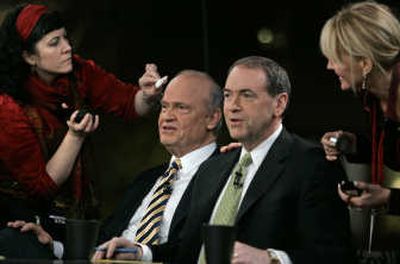Clinton, Romney take on rivals

NASHUA, N.H. – Knocked from their perches atop state polls and facing potentially damaging losses in Tuesday’s primary, Democrat Hillary Clinton and Republican Mitt Romney urged New Hampshire crowds on Sunday to vote with their heads, not their hearts.
The senator from New York and the former governor of Massachusetts excoriated their leading rivals and pitched themselves as their parties’ most logical nominees to win the White House in November and overhaul Washington as president.
Those rivals, Sens. Barack Obama, D-Ill., and John McCain, R-Ariz., opened commanding leads in a batch of primary polls released Sunday. They dismissed attacks with heavy doses of “hope” and “straight talk,” respectively.
Clinton amplified claims that her political record uniquely positions her to bring the change Democratic voters appear so eager for. She mocked the change credentials of Obama and former Sen. John Edwards by repeating accusations she leveled in Saturday night’s debate: that they flipped positions or proved ineffective on key issues in the Senate.
“If you give a speech saying you’re going to vote against the Patriot Act, and you don’t, that’s not change,” she said, referring to Obama. “If you say that you’re going to prevent members of Congress from having lunch with lobbyists … but they can still have lunch standing up, that’s not change.”
A moment later, she added: “If you gave a speech, and a very good speech, against the war in Iraq in 2002 and then by 2004 you’re saying you’re not sure how you would have voted, and by 2005, 2006 and 2007, you vote for $300 billion for the war you said you were against, that’s not change.”
An Obama spokesman defended the ethics reform as “expansive” and the renewed Patriot Act as moderately improved. Obama himself fought back by accusing Clinton of lacking faith in American potential, because in Saturday’s debate she warned against raising “false hopes” in the campaign.
“False hopes, what does that mean?” Obama asked a packed gymnasium crowd in Salem. “Is that the message we want to send the American people? To focus on constraints instead of possibilities? Did JFK say, ‘The moon, it looks too far, let’s have a reality check here. We can’t do it’?
“We don’t need leaders who will say what we can’t do,” he continued. “We need leaders who will inspire us and tell us what we can do.”
The Clinton campaign also slammed Edwards as he brought new guests – the family of a young California woman who died after her health insurer denied coverage for a liver transplant – on the first stops of a 36-hour overnight bus tour that will lead him into primary day. “In order to be president, you need to do more than read articles about people who need help and talk about them,” Clinton spokesman Jay Carson said.
Edwards responded by saying the Clinton campaign “doesn’t seem to have a conscience. This is not about them – it’s about families … who desperately need a voice.”
The Democratic dynamic – and Obama’s shadow – spilled onto the Republican side. Romney continued to label McCain a “Washington insider” and to cast himself, based on his record in politics and the private sector, as the stronger opponent against Obama in a general election.
Obama, Romney said, “will stand up and talk about change. He hasn’t ever done it, but he’ll talk about change. And he’ll be able to stand up (against McCain), as he is right now against long-serving U.S. senators who talk about their experience. He just blows them away.”
McCain avoided mentioning Romney before a crowd of 1,000 in Salem. He defended his experience in an evening televised debate from Saint Anselm College, calling himself an “agent of change” in the Senate on issues such as his early support for a shift to the “troop surge” strategy in Iraq.
The debate, aired on Fox News Channel, was more civil and sedate than Saturday night’s debate on ABC. Romney, the target of several attacks Saturday, played aggressor. He pressed his change-agent attacks on McCain and quipped to Mike Huckabee, the gregarious former governor of Arkansas: “Mike, you make up facts faster than you talk, and that’s saying something.” He also pushed Huckabee three times to say whether he raised taxes as governor.
Asked by moderator Chris Wallace about a series of foreign policy gaffes, Huckabee replied that he may have made slips of the tongue but “I don’t have a slip of my judgment, I don’t have a slip of my character, I don’t have a slip of the truth.”
Former Sen. Fred Thompson of Tennessee and Rudy Giuliani, the former mayor of New York, tossed cold water on the word of the weekend.
Thompson said he would tell America the hard truths about Social Security and energy independence. “We had some folks vote in Iowa, and we all came out talking about change,” he said, adding: “What is more important is leadership.”
Giuliani warned that Democratic candidates would raise taxes and prematurely pull troops from Iraq. “Change is a slogan,” he said, “and the examination of it has to be: Is it change for good or is it change for bad?”
The top Democrats continued to draw huge crowds across the state, ranging from 400 for Edwards in Keane to 2,500 for Clinton in Nashua. Their audiences included several undecided voters who often walked away as vexed as they came in.
Steve Lear spent hours on Saturday and Sunday waiting for and listening to Obama and Clinton in Nashua. After seeing both, Lear, a middle-aged information technology worker for an insurance company, said he is still torn but leaning toward Clinton.
“She’s not as dynamic a speaker, but that experience card is what’s got me stuck right now,” he said. “I’m really plagued by the experience thing. (Obama has) the youth and change vote locked down, but Washington is a tough place.”